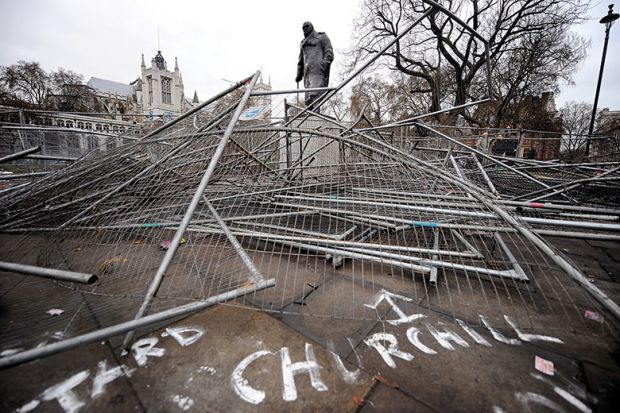Wole Soyinka recalls the moment he came face to face with what he saw as a symbol of colonial oppression on campus.
As a visiting fellow at Churchill College, Cambridge in the mid-1970s, the renowned Nigerian dramatist and poet would pass a bust of Winston Churchill on the college staircase each day.
“Each time I came down the stairs and saw that bust, I had an overwhelming urge to push it down and see it crash,” said Professor Soyinka, who in 1986 became the first black African to win the Nobel Prize for Literature.
“Churchill was representative of British imperialism – he was quite insistent that what Britain had in Africa it should hold,” added Professor Soyinka in an interview with Times Higher Education.
Speaking at Soas, University of London, where he had been interviewed by its director Baroness Amos for the college’s Centenary Lecture series, Professor Soyinka explained how those encounters with Churchill’s bust inspired what many view as his greatest play, Death and the King’s Horseman. The 1975 drama was based on a real incident in 1946 in which a colonial district officer intervened to prevent a local man committing ritual suicide.
“I eventually sublimated those feelings into Death and the King’s Horseman,” said Professor Soyinka, who has held professorships at Nigeria’s University of Ibadan and University of Ife (now known as Obafemi Awolowo University), as well as visiting academic posts at the universities of Harvard, Yale and Oxford.
In contrast, over the past 18 months, students repelled by what they see as similar symbols of racism and imperialism have not sought to sublimate or repress such feelings. Since the Rhodes Must Fall movement began at the University of Cape Town in March 2015 in protest against the continued presence on campus of a statue of colonial ruler Cecil Rhodes, students across the world have mobilised to call for the removal of other politically charged statues, plaques and honours.
Professor Soyinka described the movement as “understandable” and said that authorities should think hard about whether to retain controversial symbols, such as the small statue of Rhodes above the entrance to Oriel College, Oxford.
“If decolonisation is to be fundamentally embraced by Britain and if it is to show some level of contrition [for its imperialist history], they should not have these kind of symbols,” he said.
However, Professor Soyinka said that he recognised the extreme difficulty faced by Oriel, as Rhodes has been woven into the fabric of the university for decades.
“His name is synonymous with Rhodes scholarships, so it is far more complex than many people see,” he said, adding that Oriel is a “British college and they can have the symbols they choose”.
“The history of Britain is not mine, and they are entitled to preserve symbols that are negative to me,” he said.
Indeed, Professor Soyinka is far more critical of his own native Nigeria for its failure to confront unpleasant aspects of its own history – not least the memorials to the notorious former president Sani Abacha, who is alleged to have stolen about £5 billion from his country, as well as having forced Professor Soyinka into exile in the 1990s after he was accused of treason.
“I was talking to [current Nigerian] President [Muhammadu] Bahari and asked him, ‘Why is a major street in Nigeria still named after the greatest thief, torturer and reprobate our country has ever seen?’” said Professor Soyinka.
“He seemed surprised and said it had never occurred to him, so I replied, ‘You are campaigning against corruption, yet you are teaching young people that a major street can be named after you if you are corrupt,’” he added.
Still hailed as a powerful force in Nigerian politics and cultural life, Professor Soyinka – who spent 28 months behind bars as a political prisoner in the 1960s, including 22 months in solitary confinement – also spoke of his debt to Britain, from his childhood obsession with the novels of Charles Dickens to his time as a student at the University of Leeds in the 1950s under the supervision of the great Shakespearean scholar G. Wilson Knight and his early political activism at the University of London.
“Each time I come to Soas or one of the watering holes around Goodge Street where the West African Students’ Union met, I think, ‘This is where we conspired, talked and urged each other to go back and change Africa’,” he said.
“We felt we were born to transform the African continent – we had a focus, something to bond us together in a progressive and radical way,” he added.
With some 18,000 Nigerians now studying in the UK – a total almost on par with India’s UK-based student cohort – will they have the same transformative experience as trailblazers such as Professor Soyinka, whose first plays were performed at the Royal Court Theatre in the late 1950s?
“I don’t know if today’s students [from Nigeria] have the same political focus as we did, but I would still recommend going out [to study abroad],” Professor Soyinka said.
“In some ways, it helps you to reconnect with your origins and gives you an extra stimulus to succeed – it galvanises you.”
Wole Soyinka will be a speaker at the third annual Times Higher Education BRICS & Emerging Economies Universities Summit, being held at the University of Johannesburg later this month.
Register to continue
Why register?
- Registration is free and only takes a moment
- Once registered, you can read 3 articles a month
- Sign up for our newsletter
Subscribe
Or subscribe for unlimited access to:
- Unlimited access to news, views, insights & reviews
- Digital editions
- Digital access to THE’s university and college rankings analysis
Already registered or a current subscriber?





